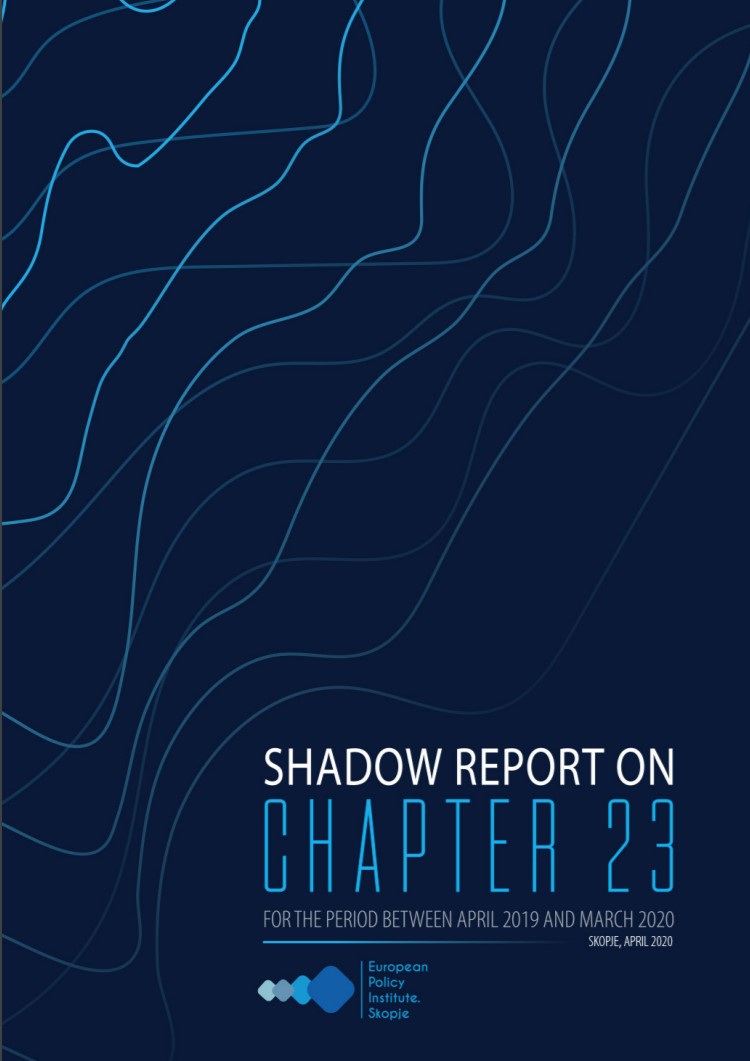This Shadow Report streamlines in a coherent unity all findings, conclusions and recommendations deriving from monitoring the areas covered by Chapter 23 -Judiciary and Fundamental Rights. This is the fifth Shadow Report published by the European Policy Institute-Skopje (EPI) while taking into consideration the comments and opinions of the 23 Network members. The previous four Shadow Reports cover the period from October 2014 to July 2015[1], then the period from July 2015 to April 2016, the period from May 2016 to January 2018 and the period from June 2018 to March 2019.
In the reporting period, despite the invested reform efforts and difficult steps it undertook, which include reaching the so-called Prespa Agreement and the Treaty of Good-Neighbourliness with the Republic of Bulgaria, at the October 2019 European Summit, the Republic of North Macedonia was not granted a date for the start of EU accession talks. Albeit not following the same pace, the country continued to work on the reforms in following with the Council conclusions. In March 2020, the EC published an Update on the country, in which it welcomed the judiciary reforms, while, inter alia, underlining that the country needs to focus on judicial reforms and proactive investigations, prosecutions and final convictions in corruption and organized crime cases, including at high level. Concerning judicial reforms, significant legislative steps have been taken to strengthen the independence of the judiciary. In this regard, North Macedonia stepped up the implementation of the reforms envisaged in the Judicial Sector Reform Strategy and action plan, addressing the earlier ‘Urgent Reform Priorities’, the recommendations of the Venice Commission, and of the Senior Experts’ Group on Systemic Rule of Law Issues. However, the Report notes that monitoring of the reforms is a priority at the highest level and there has been open dialogue with the European Commission and other partners to ensure the quality of adopted strategies and legislation. The Parliament of the Republic of North Macedonia dissolved in February 2020 in order for early general elections to be organized. However, due to the COVID-19 pandemic, on 18 March 2020, the President of the country adopted a Decision proclaiming a state of emergency on the entire territory of the country. According to Article 126 of the Constitution, in the course of the state of emergency, the Government may adopt Decrees with the force of law.
The new central independent body, the State Commission for the Prevention of Corruption (SCPC), which has a mandate to prevent and fight corruption, has been particularly active in preventing corruption. In addition to the proactive work of the SCPC, the Republic of North Macedonia has comprehensively revised the legal framework for the prevention of corruption and conflict of interests, as well as for strengthening the powers of the SCPC. The Report underscores the need to ensure the increase of the budget and resources of the SCPC, in order to enable unimpeded and efficient fulfillment of tasks by the SCPC.
The legal framework addressing problems of certain vulnerable categories of citizens has been advanced. Yet, it remains to clarify and remedy certain inconsistencies featuring the legislative solutions contained in the Law on Social Protection and in the Law on Primary Education. Despite two attempts, in the reporting period, members of the Commission for the Prevention of and Protection against Discrimination were not appointed, which left citizens without this anti-discrimination protection mechanism. Hate crimes and especially hate speech were extensively present, which demands a proactive intervention and education of the population about dangers arising from these phenomena. In the reporting period, women were targets of attacks and insults by politicians, journalists, and by other persons. Furthermore, the LGBTI+ community and the Roma remain the most vulnerable categories, being much more affected by intersectional discrimination. It is necessary to advance the efforts for enforcement of ECtHR judgments and for the prevention of the so-called recurring cases being brought by persons from the country before the Strasbourg Court. In the reporting period, the Ministry of Justice improved the conditions in prisons and advanced the legal framework for personal data protection. Freedom of expression remains a challenge to be further tackled with; journalists still report that they are subjected to threats and pressures, while those working in investigative journalism, focusing on crime and corruption, lack sufficient resources and support in order to reveal high-profile corruption cases. Further reforms of the Public Broadcaster are needed, while the challenge of fake news and suspicious financing of internet-based media still prevails.
This Shadow Report has been prepared with an institutional grant of the European Policy Institute, funded under the CIVICA Mobilitas Programme.

